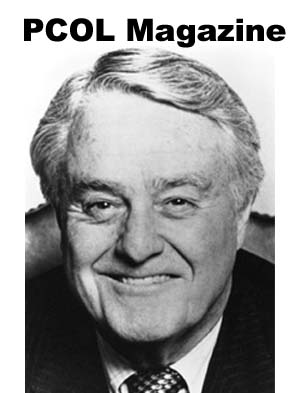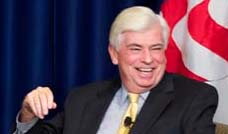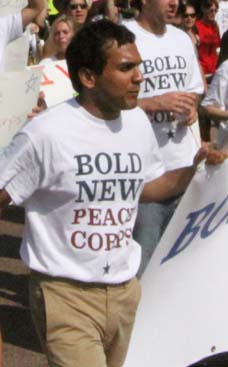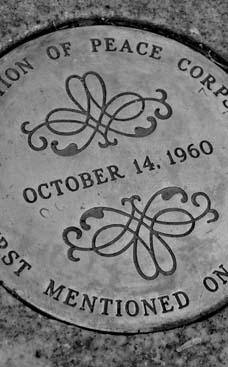
While explaining the mission of the Peace Corps to the audience, Shriver used words that defined a different generation of liberal Democrats, but ones that have particular resonance today. He said, "Many of you are suspicious of big government--of grandiose public schemes. You are worried, as I am worried, that we may, at times, be in danger of losing sight of the need for personal initiative and individuals enterprise--these ideals helped to make this country great and are major sources of its strength today." "But," he went on, "if these are among your concerns, you need not worry about the Peace Corps. For the Peace Corps is an example of free enterprise at work. It is a working model of the most basic and fundamental American ideas and beliefs." He then went on to define these ideas and beliefs, which were central to the ideals carried by the men and women of the Kennedy Administration. "First," he said, "the Peace Corps is based upon the individual--his freedom, his initiative and his responsibility." We take Americans, give them three months intensive training, and set them to work in a foreign land. No one stands over them supervising their every move. "We operate this way," he went on, "because we have faith in the American individual--his skill and his dedication. We do it because we believe in personal responsibility. And this faith has been justified." "Second, he added, "the Peace Corps exemplifies and even generates private enterprise. It is run in the cost-conscious demanding traditions of American business. We are bringing the know-how and the limitless potential of American enterprise to bear on the problems of development."
Paul Orzulak writes: It Is Social Entrepreneurs Who Carry the Kennedy Mantle Today
It Is Social Entrepreneurs Who Carry the Kennedy Mantle
Paul Orzulak
Founding partner of West Wing Writers
Posted: January 20, 2011 02:35 PM
It was fifty years ago Thursday that John F. Kennedy delivered one of the most famous inaugural addresses in history, challenging and inspiring America in ways that still resonate half a century later. One aspect that made JFK's stirring call to "Ask not" so memorable was that it focused entirely on foreign policy and America's place in the world. As Kennedy scribe Ted Sorenson recalled in his brilliant memoir, Kennedy, earlier drafts included a domestic section, but the President-elect thought "it sounded partisan, divisive, and too much like the campaign."
"Besides," Kennedy said, "It's too long anyway. I don't want people to think I'm a windbag."
For a glimpse into the values underlying the Kennedy Administration's approach to empowering individuals and conquering domestic ills -- using the kind of language that could very well have been included in the inaugural address -- is a little-known speech by Kennedy brother-in-law, Peace Corps Director and later War on Poverty point man Sargent Shriver, who died this week after 95 remarkable years.
It was a speech he delivered before the Commonwealth Club of California on October 11, 1963, just days before the three-year anniversary of the moment JFK first proposed the idea for the Peace Corps, in a campaign stop at 2:00 in the morning on the campus of the University of Michigan.
On that cold October night during the 1960 campaign, Kennedy had issued a challenge. He asked the assembled students, "How many of you, who are going to be doctors, are willing to spend your days in Ghana? Technicians or engineers: how many of you are willing to work in the Foreign Service and spend your lives traveling around the world?"
Within a week, 25,000 letters poured in from across America. Upon taking the White House, Kennedy asked Shriver to oversee the creation of a "peace corps of talented men and women who would dedicate themselves to the progress and peace of developing countries."
By the time Shriver rose to speak at the Commonwealth Club, 7,000 Americans had answered JFK's call.
While explaining the mission of the Peace Corps to the audience, Shriver used words that defined a different generation of liberal Democrats, but ones that have particular resonance today.
He said, "Many of you are suspicious of big government--of grandiose public schemes. You are worried, as I am worried, that we may, at times, be in danger of losing sight of the need for personal initiative and individuals enterprise--these ideals helped to make this country great and are major sources of its strength today."
"But," he went on, "if these are among your concerns, you need not worry about the Peace Corps. For the Peace Corps is an example of free enterprise at work. It is a working model of the most basic and fundamental American ideas and beliefs."
He then went on to define these ideas and beliefs, which were central to the ideals carried by the men and women of the Kennedy Administration. "First," he said, "the Peace Corps is based upon the individual--his freedom, his initiative and his responsibility." We take Americans, give them three months intensive training, and set them to work in a foreign land. No one stands over them supervising their every move.
"We operate this way," he went on, "because we have faith in the American individual--his skill and his dedication. We do it because we believe in personal responsibility. And this faith has been justified."
"Second, he added, "the Peace Corps exemplifies and even generates private enterprise. It is run in the cost-conscious demanding traditions of American business. We are bringing the know-how and the limitless potential of American enterprise to bear on the problems of development."
After listing specific projects from Latin America to Asia to Africa, he added, "the Peace Corps is not preaching the value of free enterprise, it is proving it. We are not engaged in ideological debates but in practical demonstration -- not abstract discussions -- but concrete results."
Does anybody talk like this in politics today? Republicans speak eloquently of business know-how and individual responsibility, but rarely match the rhetoric with concrete results. Democrats speak eloquently of empowering individuals and creating opportunity, but eschew the methodical standards of business.
As far as I can tell, the true heirs of the values underlying the Kennedy Administration today -- its approach to the world and its view of the individual -- are social entpreneurs. These are the men and women who are working in poor communities around the developing world today to apply business principles to the work of empowerment to achieve results.
Jeff Skoll, founder of the Skoll Foundation -- whose mission is to invest in, connect, and celebrate social entrepreneurs around the world once said -- "Whether the issue is disease and hunger in Africa; or poverty in the Middle East; or lack of education across the developing world - we all know the problems. But social entrepreneurs, I believe, have a genetic deficiency. Somehow, the gene that helps them look past the impossible is missing.
"By nature," he added, "entrepreneurs aren't satisfied until they do change the world, and let nothing get in their way. Charities may give people food. But social entrepreneurs don't just teach people to grow food - they're not happy until they've taught a farmer how to grow food, make money, pour the profits back into the business, hire 10 other people, and in the process, transform the entire industry."
It may be hard to see the words of John Kennedy and Sargent Shriver reflected in our current political debate today. But it's nice to see that the principles they espoused are hard at work by people across the globe, being driven by young men and women who, as Sargent Shriver said in the 1963 speech, "are proving, if proof is needed, that deeply committed individuals, prepared to work and sacrifice, can have a profound effect on the most difficult and intransigent of problems."















